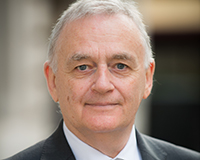 CBRE boss Bob Sulentic will earn $6.6m (£4.4m) this year, if he hits a series of targets, according to a February Securities and Exchange Commission filing. His chief operating officer, Calvin Frese Jr, will get $3.9m, which is reasonable enough for the men running the world’s biggest broker, but peanuts compared with the men running Blackstone, the world’s largest real estate private equity firm.
CBRE boss Bob Sulentic will earn $6.6m (£4.4m) this year, if he hits a series of targets, according to a February Securities and Exchange Commission filing. His chief operating officer, Calvin Frese Jr, will get $3.9m, which is reasonable enough for the men running the world’s biggest broker, but peanuts compared with the men running Blackstone, the world’s largest real estate private equity firm.
Boss Stephen Schwarzman earned $656m in 2014: $350,000 pay, $85m “carried interest” – profits from investments – plus $571m in dividends. Head of real estate Jon Gray got $205m: same salary, $28.2m bonus, $76.7m carried interest, plus $99.8m in dividends. This year Schwarzman’s compensation could top $1bn, Gray’s $250m.
The words of Poldark’s servant Judd came to mind after gasping in wonderment at the size of their rewards: “T’aint right, t’ain’t fit, t’aint fair, t’ aint friendly.” But after a choppy cruise through the 341-page accounts and with some guidance from Blackstone, I came to a less jealous conclusion: “T’is just capitalism.” Blackstone is one of the best money-making machines on the planet.
The 2,000-strong firm manages $290bn of assets. These generated income of $7.5bn in 2014, which cost $3bn to collect. The $4.5bn gap is listed as “economic income”. About $1.8bn of this came via the real estate division, which manages $81bn of assets. Bottom line “distributable earnings” for the whole firm amounted to $3bn last year, 64% up on 2013. Profit enough to satisfy Croesus.
A spokeswoman says Schwarzman’s compensation was “deliberately structured to be fully aligned with both fund investors and shareholders”. There are 13 shareholder directors who own 29%. Staffers outside the charmed circle hold 21%. The other 50% is held by outside shareholders.
Investors have done well. Since 2005 Blackstone has spent around $58bn buying real estate. Those providing money have enjoyed 11% to 27% internal rates of return thanks to well-timed deals such as the purchase and sale of 50% of Broadgate, EC2, which netted £500m. Blackstone makes profits, case proven.
Schwarzman has defended his $656m compensation. Speaking to Harvard students last month, the billionaire 11 times over said: “Because you start a company, you own stock… it’s no different than if you were a Steve Jobs starting his company, versus a Tim Cook who’s working there.” Best to just swallow very hard and try not to be jealous.
PS: Private equity firms globally reaped a record $428bn by selling holdings last year, a 30% increase from 2013, according to research from Preqin. Last May, Apollo boss Leon Black said: “It’s almost biblical… there is a time to reap and a time to sow. We’re harvesting… we’re selling everything that’s not nailed down.”
Wise words from MIPIM
The truth of some conversations in Cannes still resonates two weeks after attending MIPIM.
One, London beware: in 10-20 years Berlin will be the capital of Europe. Including finance, I would add, as money follows power.
Two, watch out for WeWork. Serviced office experts will know the fast-expanding US business as the new and groovier Regus. Those in London will know it is renting 160,000 sq ft at Brookfield’s Moorgate Exchange, EC2. Those working on the project know that what makes WeWork special is not the wooden floors, but that it can squeeze one renter into as little as 44 sq ft, way below the norm.
Three, a chat with Canary Wharf Group managing director Joe Pagano made clear the ambitions the company has to build homes for rent: about 1,500 units at the last count, 500-odd in Newfoundland Tower, the rest on Wood Wharf.
PS: Anyone remember Kazan as “the city of the future” at MIPIM 2008? The Cossack choir? The long-legged ladies in electric blue micro-dresses? The map that had to be published in EG to show the place was 450 miles east of Moscow? Sean Quinn, once Ireland’s richest man, clearly found the place. The Irish government sequestered his assets in 2012, when he was declared bankrupt. It has now twice failed to sell a shed park in Kazan for $40m that once belonged to Quinn.










